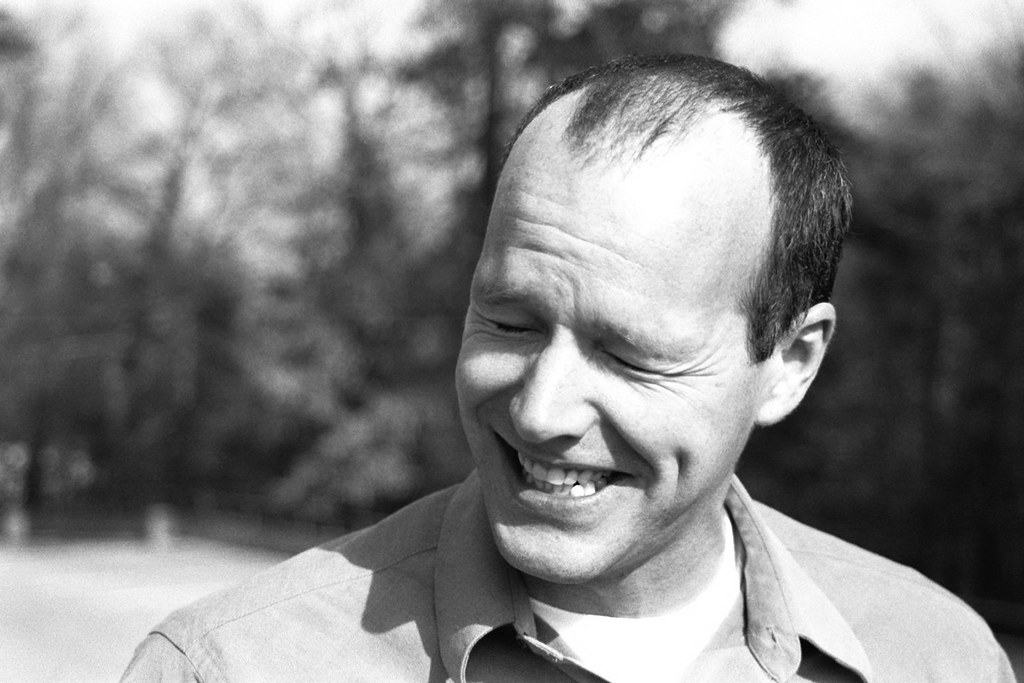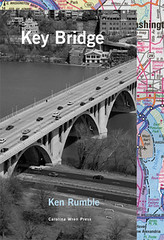Old Introductions: John Taggart & Randall Williams
5. “floating / untethered // crows then / maypoles // lassoes and paper / thin joints // light now / tissue now // a junk horse / rebuilding.”
6. Randall Williams lives in a cabin in the woods in Hillsborough near a large pond surrounded hardwood forest. Some day he might float a bonfire out in that pond that would light up pages from which people might read poems.
7. “are you earth or geologist? // From the basement, permits / to touch unpainted sculptures // didactic or otherwise cross-legged / an electrical outlet makes the bed possible / the moon looks so ridiculous again”
8. Once Randall put himself into two boxes simultaneously. One spun in the air and held his vague form; the other bounced from a screen as light.
9. “each thought contains a thousand ignorable vistas / and one California diner // what is operative is often / the static point of relation // a salt shaker, for instance”
10. Randall’s ukulele came from Hawaii; Randall was with it; the ukulele was not afraid even though Randall once owned a car called a Fury.
11. “I sliced through various roots. It lifted its legs as if bound, hog tied or stretching. Left eye, right eye, left eye, right eye. Do they really think violent acts are not surrounded by household objects? It appeared to be leaping. If there’s one thing chickens are good for”
12. Randall has guns, and his guns are two places simultaneously: one, the gun is in your hand; two, the olive can jumps.
13. “Cicada, open this ambition / I am frightened of firings / I am moved by cold pocket watches // Confounded by severances”
14. Randall has been out of North Carolina for only a small part of his life; North Carolina has never been out of Randall.
15. “Could we please just save the unborn of Baghdad? Gaseous globe, ambition, her father is a theme sweater made of state lines while I am crumpled light. Black ink on a white tortoise shell, my fingers slowly enter the crowed noon. George lays a card on each swan’s back.”
16. Randall has many chickens; most of them are actually roosters; he eats one occasionally.
17. “A rope descends in such a way as to make the stage real. Ten thousand eyes on a plastic box. And inside this box, a tiny bit of sky formed into thighs. // When your hair meets dusk, I am a pinprick coming through a wooden box camera.”
18. Randall’s poetics is one of extreme pressure, extreme pressure and openness, extreme pressure on language and extreme openness to a fluid view of myth-making – Randall’s poetics is like the pond he lives near and the boxes he appeared in and the ukulele which follows him and like the Fury and like his simultaneous guns and North Carolina and his chickens
19. “to see (see) white / her lines / of 34 / fabricated, odd / what every phrase is not // a bursting forth cyclically / onto the deck / through the ghosts”
20. Please welcome Randall Williams.
21. In “Pastorelle 7” John Taggart writes, “the problem is not finding a rock there are / many // the problem is not turning / into a rock // the problem is a problem of how / far how far can I throw myself” and in his earlier collection When the Saints he writes, “the subject was roses the problem is memory / that was the subject roses piled to burn / … / the problem is memory the problem a problema / the problem a problema a problem to find / a problem to find the unknown”
22. Of the many problems that Taggart’s work engages one of the more fundamental is, as he says, the problem of finding the unknown within what we know, the problem of extending beyond the forms we know into a place where discovery is possible, even inevitable.
23. From “Inside Out”: “It is you who have to hear it is you who have to hear it / is you who have to sit under the singing of the bird it is / you who have to sit in the court of / the bird to assent to the singing as prayer / being heard it is you who have to / sit in a kind of silence in a kind of / silence in which the singing may endure in / which the singing only the singing may endure in you.”
24. John Taggart is the author of the poetry collections When the Saints, Loop, Standing Wave, Peace on Earth, and others, most recently he published Pastorelles which the late Robert Creeley described as “making particular the mind and heart’s persistent need.” In addition, Taggart is the author of Remaining in Light, a study of the paintings of Edward Hopper. He also was the founder and editor of the acclaimed literary journal Maps. A two time NEA Fellow in Literature, several years ago he retired from the interdisciplinary faculty at Shippensburg State University in Pennsylvania.
25. He writes in “Henry David Thoreau/Sonny Rollins”: “for two years / alone with the alone // alone with the alone saxophone / in the air / alone in the night air and high above the East River / heimarmene and black water of the river // without a you to do a something to me / without a song in the air.”
26. Poetry’s roots are in song, and Taggart writes at those roots with the use of repetition that calls to mind the evolving melodic phrases that give shape to much improvised music. It is his use of repetition that has become a hallmark of Taggart’s work and for many years set him apart from any of the various contemporary poetic camps.
27. “To breathe through the mouth to breathe through the / mouth to breathe to sing to / sing in the most quiet way to / sing the seeds in the earth breathe forth / not to whisper the seeds not to whisper in the earth / to sing the seeds in the earth the most quiet way to / sing the seeds in the earth breathe forth.”
28. We might wonder where Taggart’s focus on form and repetition might originate, and to find an answer, we might just look around, look around and see the fundamental way in which we are part of and reside within an endlessly repeating and varying form.
29. He writes in “At the Counters’ Ball”: “after the ball is over back in their counting houses / the counters will be counting what’s lost // and all the counters are laughing because I asked Emily ‘do I repeat / myself’ and she said ‘very well’ and they’re dancing”
30. Please welcome John Taggart.



0 Comments:
Post a Comment
<< Home